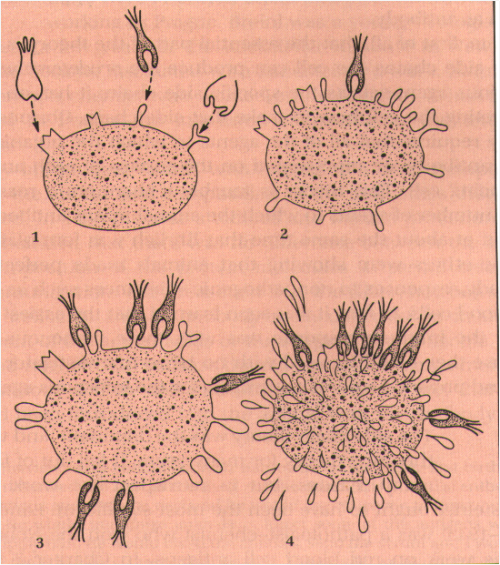Like Humans, These Big-brained Birds May Owe Their Smarts To Long Childhoods

Like humans, these big-brained birds may owe their smarts to long childhoods
Human beings typically don’t leave the nest until well into our teenage years—a relatively rare strategy among animals. But corvids—a group of birds that includes jays, ravens, and crows—also spend a lot of time under their parents’ wings. Now, in a parallel to humans, researchers have found that ongoing tutelage by patient parents may explain how corvids have managed to achieve their smarts.
More Posts from We-are-all-paranoid and Others
Reminder that the "fittest" in "survival of the fittest" does not mean "strongest/most violent".
It refers to an animal that is best fitted to thriving in a given ecological niche. A fit animal is one that is successful at the tasks of finding food food and water, avoiding predators, and reproducing, by whatever means work best for their situation.

Antibodies are the secreted form of B-lymphocyte receptors and are a part of adaptive immunity, but how are these proteins formed?
Above is a diagram illustrating Paul Ehlrich’s Side Chain Theory of Antibody Formation. Ehlrich proposed that immunoglobulin molecules, a fundamental component of adaptive immunity, served as membrane bound proteins that bound to particular threats, similarly to the former “key in lock” view of enzymes in catalyzing biological reactions. Ehrlich also suggested that the action of binding a pathogenic molecule to the receptor would generate a signal to stimulate the production of more receptors of the same specificity. These “side chains” that were added on would then break off from the cell surface and become what we call antibodies.
We now know, however, that soluble immunoglobulin receptors are specially manufactured to be secreted as antibody, rather than just “breaking off” of the lymphocyte, even though they have the same specificity as their membrane-bound counterparts.

Metastatic embolus from breast adenocarcinoma in the lungs
cancer cells are usually very metamorphic, which you can tell by the different shapes of the nuclei in this embolus. i love how you can see the metastasis inside a vessel perfectly in this picture!
How SARS-CoV-2 Hijacks Human Cells to Evade Immune System

Researchers at University of California San Diego School of Medicine have discovered one way in which SARS-CoV-2, the coronavirus that causes COVID-19, hijacks human cell machinery to blunt the immune response, allowing it to establish infection, replicate and cause disease.
In short, the virus’ genome gets tagged with a special marker by a human enzyme that tells the immune system to stand down, while at the same time ramping up production of the surface proteins that SARS-CoV-2 uses as a “doorknob” to enter cells.
The study, published April 22, 2021 in Cell Reports, helps lay the groundwork for new anti-viral immunotherapies — treatments that work by boosting a patient’s immune system, rather than directly killing the virus.
“It’s very smart of this virus to use host machinery to simultaneously go into stealth mode and get inside more cells,” said Tariq Rana, PhD, professor and chief of the Division of Genetics in the Department of Pediatrics at UC San Diego School of Medicine and Moores Cancer Center. “The more we know about how the virus establishes itself in the body, the better equipped we are to disrupt it.”
In human cells, genes (DNA) are transcribed into RNA, which is then translated into proteins, the molecules that make up the majority of cells. But it’s not always so straightforward. Cells can chemically modify RNA to influence protein production. One of these modifications is the addition of methyl groups to adenosine, one of the building blocks that make up RNA. Known as N6-methyladenosine (m6A), this modification is common in humans and other organisms, including viruses.
In contrast to humans, the entire genomes of some viruses, including SARS-CoV-2, are made up of RNA instead of DNA. And rather than carry around the machinery to translate that into proteins, the coronavirus gets human cells to do the work.
Rana and his team previously discovered that m6A plays an important role in HIV and Zika virus infections. In their latest study, the researchers discovered that the human enzyme METTL3 adds methyl groups to introduce m6A in SARS-CoV-2’s RNA. That modification prevents the virus’ RNA from triggering inflammatory molecules known as cytokines. To the team’s surprise, METTL3’s activity also led to increased expression of pro-viral genes — those that encode proteins needed for SARS-CoV-2 replication and survival, such as ACE2, the cell surface receptor that the virus uses to enter human cells.
“It remains to be seen why our cells help the virus out like this,” Rana said.
“How SARS-CoV-2 Hijacks Human Cells to Evade Immune System“

i learned that there are no skeletons in the wreck of the Titanic or debris field. At depths of 3,000+ feet, seawater is undersaturated with calcium carbonate. Once animals ate the flesh of Titanic's passengers and crew, their bones dissolved (x)










Neil Druckmann - HBO's The Last of Us Podcast: Episode 5

The bacteria wars are coming. Researchers at Tel Aviv University have pitted “good” bacteria against “bad” bacteria and the good guys, it appears, are winning.
If the system can be scaled, this new approach could potentially replace antibiotics, which are increasingly struggling against antibiotic-resistant “superbugs.” For the TAU study, the researchers used a toxin injection system known as a “Type 6 Secretion System.” It’s usually deployed by pathogenic (“bad”) bacteria. They introduced the system into a “friendly” bacterium, Vibrio natriegens, which is not harmful to humans. The researchers described their technology as similar to a microscopic poison arrow shot from a good bacterium to eliminate a bad bacterium under specific conditions. “The system that we built allows us to engineer ‘good’ bacteria that can recognize pathogenic bacteria, attack them with toxins, and neutralize them,” explains Dr. Dor Salomon, who co-led the study. “We know how to change and control every component in the system and create a bacterium that neutralizes different strains of bacteria. This is proof of feasibility, showing that we have the knowledge and ability to create bacteria that take advantage of this killing system and may serve as antibiotic treatments. ”The current bacteria prototype is best suited for bugs that occur naturally in saltwater. This is a growing concern, as fish and seafood constitute a major food source in many regions of the world. “Their productivity is severely impaired as a result of bacteria-borne diseases,” Solomon notes, “and since we want to avoid pouring antibiotics into aquaculture farms, a biological solution such as the one we have developed is an effective alternative.” The system will eventually be adapted to treat pathogenic bacteria in humans, farm animals and plants. Tel Aviv University has filed a patent application through Ramot, the university’s technology-transfer company. In addition to Solomon, Dr. Biswanath Jana and Kinga Kappel of the department of clinical microbiology and immunology at TAU’s Sackler Faculty of Medicine participated in the research. The results were published this month in the scientific journal EMBO Reports.
not to be positive on main but sometimes things really are ok. sometimes you really will be happy and safe and warm. sometimes you really will be giggly and blushy and full of love. sometimes the night is chilly and your home is cozy and your tea is perfectly steeped and your phone lights up with a message from someone you love. sometimes life really is quite lovely.
-
 luciferapollyon reblogged this · 1 month ago
luciferapollyon reblogged this · 1 month ago -
 captsmitty84 liked this · 4 months ago
captsmitty84 liked this · 4 months ago -
 chetverge reblogged this · 7 months ago
chetverge reblogged this · 7 months ago -
 mysweetsageofgrace liked this · 8 months ago
mysweetsageofgrace liked this · 8 months ago -
 davebriggs007 reblogged this · 10 months ago
davebriggs007 reblogged this · 10 months ago -
 irusillusion reblogged this · 1 year ago
irusillusion reblogged this · 1 year ago -
 deuce-n-dirty liked this · 1 year ago
deuce-n-dirty liked this · 1 year ago -
 who-do-you-think-took-your-penis reblogged this · 1 year ago
who-do-you-think-took-your-penis reblogged this · 1 year ago -
 who-do-you-think-took-your-penis liked this · 1 year ago
who-do-you-think-took-your-penis liked this · 1 year ago -
 antifascism reblogged this · 1 year ago
antifascism reblogged this · 1 year ago -
 petalouda liked this · 1 year ago
petalouda liked this · 1 year ago -
 wildernestt reblogged this · 2 years ago
wildernestt reblogged this · 2 years ago -
 geosmin-smell reblogged this · 2 years ago
geosmin-smell reblogged this · 2 years ago -
 theonlyleftydesk reblogged this · 2 years ago
theonlyleftydesk reblogged this · 2 years ago -
 golden-poppy-crafts liked this · 2 years ago
golden-poppy-crafts liked this · 2 years ago -
 anemona8776 liked this · 2 years ago
anemona8776 liked this · 2 years ago -
 cspiwak liked this · 3 years ago
cspiwak liked this · 3 years ago -
 molecularlifesciences liked this · 3 years ago
molecularlifesciences liked this · 3 years ago -
 m0ss79 liked this · 3 years ago
m0ss79 liked this · 3 years ago -
 jeteplumerailesyeux liked this · 3 years ago
jeteplumerailesyeux liked this · 3 years ago -
 dutifullydeafeningkryptonite reblogged this · 3 years ago
dutifullydeafeningkryptonite reblogged this · 3 years ago -
 dutifullydeafeningkryptonite liked this · 3 years ago
dutifullydeafeningkryptonite liked this · 3 years ago -
 gwizardmd liked this · 3 years ago
gwizardmd liked this · 3 years ago -
 mannersmakethme reblogged this · 3 years ago
mannersmakethme reblogged this · 3 years ago -
 mannersmakethme liked this · 3 years ago
mannersmakethme liked this · 3 years ago -
 cursed--alien reblogged this · 3 years ago
cursed--alien reblogged this · 3 years ago -
 an-abyss-called-life liked this · 3 years ago
an-abyss-called-life liked this · 3 years ago -
 we-are-all-paranoid reblogged this · 3 years ago
we-are-all-paranoid reblogged this · 3 years ago -
 jstaprettymfimadatgloiscia liked this · 3 years ago
jstaprettymfimadatgloiscia liked this · 3 years ago -
 goddamnbirds reblogged this · 3 years ago
goddamnbirds reblogged this · 3 years ago -
 lonelycurse reblogged this · 3 years ago
lonelycurse reblogged this · 3 years ago -
 durinsbride liked this · 3 years ago
durinsbride liked this · 3 years ago -
 ayumunoya liked this · 3 years ago
ayumunoya liked this · 3 years ago -
 thatforestprince liked this · 3 years ago
thatforestprince liked this · 3 years ago -
 flooferdoodles liked this · 3 years ago
flooferdoodles liked this · 3 years ago -
 girloncouch liked this · 3 years ago
girloncouch liked this · 3 years ago -
 beaglerlove liked this · 4 years ago
beaglerlove liked this · 4 years ago -
 light-years-too-early liked this · 4 years ago
light-years-too-early liked this · 4 years ago -
 alaspoon liked this · 4 years ago
alaspoon liked this · 4 years ago -
 soreandscary liked this · 4 years ago
soreandscary liked this · 4 years ago -
 gotham-kid-on-a-budget liked this · 4 years ago
gotham-kid-on-a-budget liked this · 4 years ago -
 peetyboy1999 liked this · 4 years ago
peetyboy1999 liked this · 4 years ago -
 imagineparacosms liked this · 4 years ago
imagineparacosms liked this · 4 years ago -
 ecosmowarrior liked this · 4 years ago
ecosmowarrior liked this · 4 years ago -
 katupiee liked this · 4 years ago
katupiee liked this · 4 years ago

